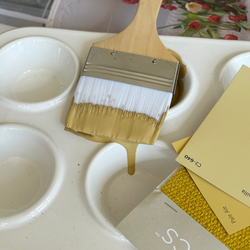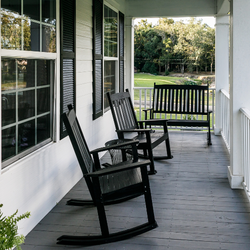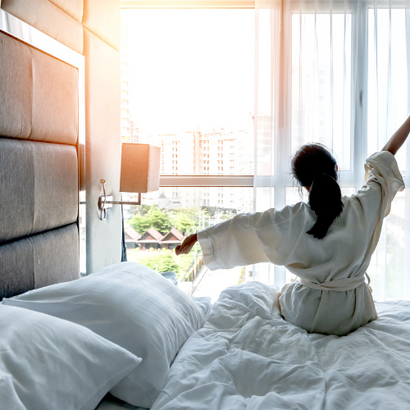Your Cart is Empty
Orders are processed within 1-2 business days, Mon-Fri., for regular and expedited orders.
Orders are processed within 1-2 business days, Mon-Fri., for regular and expedited orders.
Sleep Your Way Happy: 7 Simple Tricks to Wake Up Rejuvenated
Humans spend about 1/3 of our lives sleeping. It's as essential to our bodies as breathing, eating, or drinking water. While getting a good night's rest seems like a reasonable idea, it's said that only 1 in 3 people get the recommended 7-8 hours, which can seriously impact a person's mental and physical health. The brain carries out many vital functions when we sleep, including our ability to fight disease, manage metabolism and rid our bodies of toxins. Many refer to sleep as a life support system—and we can see why!

Here are 7 simple remedies that can help you maximize your zzzs.
1. Color Control

We all know about the psychological effects color has on our psyche so choosing the right bedroom color plays a lead role in how we create a calming environment. Cooler shades like blues and greens have a calming effect, which can help slow down the way your brain functions, thus aiding you in falling asleep easier. On the other hand, warm colors such as red increase alertness, so these shades might not be the best choice for your bedroom (save oranges and reds for the kitchen!). There's also your personal preference to consider. See our most popular bedroom colors hereor speak to a professional about the best choice for you!
Sleep is that golden chain that ties health and our bodies together. - Thomas Dekker
2. Create a "Wind Down" Routine

Just like we have routines when we wake, we need to create a similar "wind-down" routine to help us mentally and physically prepare for a good night's rest. Some tips include:
- Go for a short 10-minute walk after dinner
- Don't eat too late (our bodies need time at night to detox)
- Enjoy a warm bath with magnesium salts
- Try chamomile tea, a magnesium drink like Calmor some tart cherry juice to help release melatonin!
- Limit caffeine (none after noon) and alcohol (the sugars will disrupt your REM)
- Set a bedtime alarm
- Spritz your bedding with lavender, known to induce relaxation (your brain will start to make the connection!)
- Turn off all devices at least 30-60 minutes hour before bed
- Read or journal
3. Be Cool
WebMD says that temperature directly affects the quality and length of your sleep because the body has a fixed temperature setting that it attempts to reach during the night. So, make your room cool, dark and quiet. Dropping your body temperature to around 65 degrees is said to be the ideal sleep temperature while keeping your room dark naturally triggers the hormone melatonin. So, dim the lights and snuggle up. Maybe even try a weighted blanket to calm any jitters!
4. Invest in a Good Mattress

Who can sleep when they have coils poking them in the back? If you wake up sore or tired, it might be time to invest in a quality mattress. Considering we (ideally) sleep 8 hours a night, it's recommended that it be replaced about every 10 years, so it's an investment worth saving for! Be picky and make it personal. Consider the size, firmness, your body type-- and if you and your partner can't align on your ideal sleep style, plenty of mattresses have dual settings.
5. Lights Out
For all the insomniacs out there, it might be time to reconsider sleeping with a night light – or any light – on. Even seemingly innocent light sources can interfere with your body's production of melatonin, which helps ensure that your body gets enough rest. So, if possible, eliminate all light sources, including those emitted by electronic devices. It might even be time to try out that new silk sleep mask!
6. Create a Noise Free Zone

In the same way you need to eliminate light during bedtime, you also need to remove the noise, from ticking clocks to the TV. This will allow your brain to reach a more relaxed state. However, if too much silence keeps you on edge, try a meditative app like Calm or Headspace, which can help you relax through guided meditations, white noise, or nature sounds.
6. Write it Out

Many of us go to bed only to have our minds go 100 miles an hour, worrying, planning, or rehashing the day. One of the best ways to calm your mind is to keep a notepad beside your bed to write down any worries, and to-dos—or go one step further and write down three things you are grateful for.
7. Get Up
Wait, what? It might sound counterintuitive, but sometimes the best way to get back to sleep is to get up. After 20-30 minutes of sleeplessness, our minds will begin to associate the bed with being awake, so get up, read or do something else, and then return to bed when you're sleepy. You can help break the sleeplessness cycle by rewiring your brain to associate sleep with your bed.
PS – If you try all the tricks and still can't sleep, ask your doctor for recommendations!
Also in Color Confidential
Subscribe
Sign up to get the latest on sales, new releases and more …
Recent Articles
- What Paint Should I Use? Your Guide to the Right Product for Each Room

- How Builders Using C2 Paint to Position Themselves as Industry Leaders

- These Paint Color Palettes Can Transform Your Smaller Bathroom into a Luxurious Respite

- 5 Ways to Harness the Power of Color in Your Interior and Exterior Paint Projects

- The Ten Commandments of Choosing Color

- Refresh Your Home This Spring: Top Painting Projects (Plus Recommended Products!)

- The Ultimate Guide to Choosing the Perfect Deck Stain for Your Home

- Painting Kitchen Cabinets: Your DIY Guide to a Perfect Finish

- Boosting Your Home's Value: 6 Home Improvement Projects for Maximum ROI

- Supercharge Your Aspirations by Choosing the Right Paint Color

Categories
- 2020 Color of the Year
- architecture
- art basel
- bathroom paint colors
- bedroom colors
- best bedroom color
- best blue paint 2019
- best green paint
- best grey paint colors
- best grey wall colors
- best neutrals
- best paint colors
- best paint colors for 2020
- best white paint color
- black and white
- black paint
- blue mood board
- blue paint
- blue paint color
- blue paint colors
- C2 paint
- c2 partners
- c2paint
- calming bedroom colors
- calming paint colors
- ceiling paint
- ceiling paint color
- christmas list
- classic paint colors
- color combinations
- color of the month
- Color of the Year
- color of the year 2023
- color palette
- color theory
- color tips
- color trends
- design miami 2018
- design tips
- design trends 2021
- design trends 2024
- eco-friendly
- exterior paint colors
- feng shui paint colors
- full spectrum
- full spectrum color
- full spectrum paint
- gift guide
- gift guide 2021
- gray paint colors
- grey color trends 2010
- grey paint
- grey paint colors
- grey walls
- holiday gift guide
- holiday picks
- home improvement
- home office
- home painting
- home projects
- house paint
- house paint colors
- how to paint floors
- insider tips
- interior colors
- interior desi
- interior design
- interior design best paint colors
- interior design tips
- interior design trends
- interior designer
- interior paint
- interior paint colors
- luxury paint
- maximalism
- mediation room
- meditation
- meditation area
- mexico city
- millwork
- minimalism
- modern decor
- modernism weekly
- moodboard
- neon color trend
- nicole newkirk
- office paint colors
- orange
- paint
- paint color
- paint colors
- paint contractors
- painted furniture
- Philippa Radon
- stockholm design week
- surface design show
- sustainable interior design
- tiny homes
- travel
- trend report
- trends 2024
- vision board
- wall color
- wall paint
- white interior paint
- white paint
- zoe feldman
Subscribe
Sign up to get the latest on sales, new releases and more …
×
There’s a C2 Paint Dealer near you!
Visit the store to get exceptional, in-person service. Click below to see store details
See My Store













